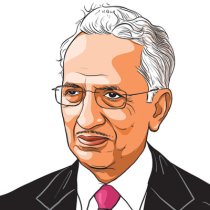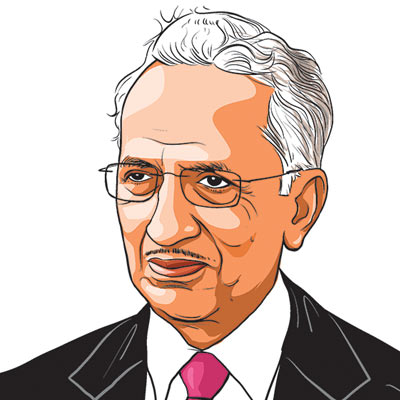Towards a people’s police
The police force needs to be freed from the stranglehold of the executive and given functional autonomy to enforce the rule of law. The Supreme Court’s directions can help achieve this transformation.

The government of India (GoI), meanwhile, came up with the concept of SMART police in 2014 — police that would be strict and sensitive, modern and mobile, alert and accountable, reliable and responsible, tech-savvy and trained. (Illustration: CR Sasikumar)
The battle for police reforms has been going on for the last 22 years. The Supreme Court took 10 years to give a historic judgment in 2006. Since then it has been a struggle to get the Court’s directions implemented. It is a sad commentary on the working of our institutions that the state governments, when it is politically inconvenient, show scant regard to the directions given by the highest court of the land. There are very strong vested interests opposed to any structural changes in the police set-up, which we inherited from the British.
The judiciary is nevertheless to be given credit for pursuing the implementation of its directions on police reforms, even though there have been periods when the matter went into a dark tunnel. On July 3, 2018, responding to an interlocutory application filed by the Ministry of Home Affairs (MHA), the Supreme Court gave a slew of directions to ensure that there are no distortions in the appointment of Director General of Police (DGP) of the state. It laid down that the states shall send their proposals three months prior to the retirement of the incumbent DGP; that the UPSC shall prepare a panel of three officers suitable for elevation to the post of DGP; that the state shall appoint one of the persons from the panel only; that there would be no appointments of Acting DGP; that a person appointed as DGP should continue to hold the post for a reasonable period “beyond the date of superannuation”; that the UPSC should as far as practicable empanel officers who have got clear two years of service, giving due weightage to merit and seniority; and that “any legislation/rule framed by any of the states or the Central Government running counter to the direction shall remain in abeyance”.
This detailed clarification became necessary because several states were misusing the apex court’s directions on the point to suit their political calculations. In one state, the DGP was regularised in his assignment hardly an hour before he was due to retire. In another state, the DGP was in acting capacity for more than a year and thereafter regularised, giving him tenure of more than three years. The Supreme Court took cognisance of these aberrations and laid down the ground rules for the states to follow.
The Supreme Court’s intervention is to be lauded. However, the fact remains that this has been the only positive intervention during the last 12 years. During this period, Justice Thomas Committee (2010) expressed its “dismay over the total indifference to the issue of reforms in the functioning of police being exhibited by the states”. Two years later, Justice Verma Committee, which was constituted to examine amendments in Criminal Law in the context of a gang rape incident, had expressed its belief that “if the Supreme Court’s directions in Prakash Singh are implemented, there will be a crucial modernisation of the police to be service oriented for the citizenry in a manner which is efficient, scientific and consistent with human dignity”. Regrettably, there was no follow-up action on either of the above two reports.
The government of India (GoI), meanwhile, came up with the concept of SMART police in 2014 — police that would be strict and sensitive, modern and mobile, alert and accountable, reliable and responsible, tech-savvy and trained. There was, however, no effort by the MHA to make the concept a reality. The states were, of course, unconcerned. Taking a long-term of view of states’ indifference to systemic improvements in police, it is high time that GoI consider bringing police in the “concurrent list” of the Constitution.
The Supreme Court’s intervention on July 3 is a small step forward. There is, however, a long road ahead which has yet to be traversed. States have constituted security commissions, as directed by the Supreme Court, but their composition has been diluted and their charter curtailed. There is an attempt by the Department of Personnel to subvert the Court’s direction regarding police establishment board, apart from the fact that the boards already constituted are not as per the judicial directions. Officers in the field are transferred round the year. There is tardiness in the separation of investigation from law and order functions. The complaints authorities are generally dysfunctional. Apart from these structural changes mandated by the Supreme Court, which have yet to be carried out in letter and spirit, there is need to fill up the huge vacancies in the police and upgrade its infrastructure in terms of housing, transport, communications and forensics.
Achieving all this may sound a tall order, but the tragedy is that the executive has not shown a commitment to police reforms. Our rulers need to understand that development needs solid foundations of good law and order. According to a recent estimate, crime, terrorism and external threats take a huge toll on economic growth and that these cost India 9 per cent of its GDP, which is a very high figure (China lost only 4 per cent, Japan 3 per cent).
If India is to achieve its status as a great power, it is absolutely essential that police is restructured and modernised. Unfortunately, there are politicians who cannot think of surviving without police at their beck and call. There are bureaucrats for whom lording over the police has become an addiction they are not prepared to give up. These vested interests need to be countered by the combined pressure of public opinion, with support from the media and NGOs. The country needs another zamindari abolition with police being freed from the stranglehold of the executive and given functional autonomy to enforce the rule of law. We have had enough of Rulers’ Police, what we need today is People’s Police. The transformation is overdue.
The writer was formerly director general of BSF and DGP UP and Assam. Views are personal
For all the latest Opinion News, download Indian Express App
More From Prakash Singh
- A case of selective outrageKathua and Unnao incidents are barbaric, but calling these the darkest hour since Independence is an overstatement...
- Fear and faithUnder Yogi government, Uttar Pradesh police has instilled fear in criminals. But has it won the people’s faith?..
- Give police its dueTo enable the force, revisit the constitutional arrangement. Union government must also own its responsibility in the matter...








































No hay comentarios:
Publicar un comentario